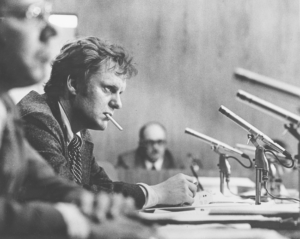There’s a lot you can do if you’re a City Council member in Minneapolis.
Someone came to me while I was on the Council and told me they were being evicted from their apartment because the landlord hadn’t paid the utilities. They thought they should be able to pay delinquent utilities and have that amount deducted from their rent. I thought, what a great idea, so I authored an ordinance at the next Council meeting to allow tenants to pay utility bills to avoid shut-offs and deduct that from their rent.
Louis DeMars, the president of the Council, said I should chair a task force to study the problem made up of representatives of the gas, electric and water utilities. Louis was always doing that. Whenever I came up with some bright new idea, he’d make me chair of a task force to study it. It was time-consuming, but it helped insure the proposal was well thought out and it gave me time to build political support for it.
The meeting went fine. The utilities didn’t want to have to notify tenants; it was an extra step, but they went along with it. The Water Department was especially resistant, which I found curious because they don’t have to show a profit or please their stockholders. The stockholders for the Water Department are the customers they’re serving, but public service for the Water Department seemed to mean doing the same things in the same way.
The ordinance passed unanimously, but it was soon forgotten. I’m sure, today, no one is aware of that protection for tenants, and if no one is aware that the law exists, then, for all practical purposes, the law doesn’t exist.
A few years after I left the Council, Brian Coyle told me he was concerned about half-way houses concentrating in his ward. I told him I had authored and passed a zoning ordinance that said no half-way house or group home could be within 500 feet of another half-way house or group home. There were so many of them, one on top of another, they were changing the character of the neighborhoods. It wasn’t so much a NIMBY (Not In My Back Yard) move as a gesture to Share the Wealth. Group homes and half-way houses should be spread more evenly across the city.
One modest change that had a big effect was changing the zoning ordinance for saunas from a neighborhood business to a community business. Before he left office, my predecessor allowed a sauna to go in at 43rd and Chicago. It opened the month I took office, so, naturally, the neighbors blamed me for destroying the neighborhood by letting a house of prostitution in the neighborhood. Without discussing morality, I argued that most of the customers came from outside the neighborhood, so, because it put a strain on parking, a sauna should be located in a more heavily commercialized location
Two other proposals were less successful.
Park and Portland Avenues ran from 25th Street to 46th Street, two miles, in my ward, and they were dangerous for bicycle riders. I got the Traffic Department to designate the right side of Park and Portland a bike lane and to eliminate parking, but then I was told I had eliminated six handicapped parking places. I immediately canceled the bike lanes until we could figure out how to have bike lanes and handicapped parking. Clearly the best bike lanes are those you don’t have to share with cars, and, therefore, rather than have bikers run down Park and Portland, it might be better to give them Oakland Avenue. Cars might still drive on Oakland but only for one block and then they would be diverted to Park or Portland, but bikes would be allowed to drive through the intersections without stopping except for traffic lights at Franklin and Lake Street.
Another project that died before it was fully grown was my attempt at recycling. I tried to convince my colleagues on the Council. They were unimpressed. I tried an experiment in my ward. I wrote to the residents on one garbage route that they could recycle their newspapers by bundling them and leaving them separate from their garbage. Most residents cooperated, but Clayton Sorenson, the city engineer, couldn’t see the point. “And glass! Why would you want to recycle glass? We’re not going to run out of sand!”
Bicycle lanes and recycling would have to wait for another generation.























